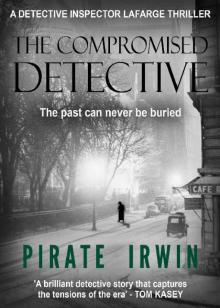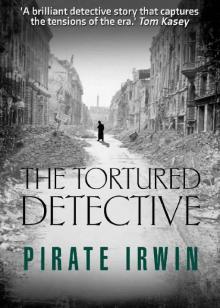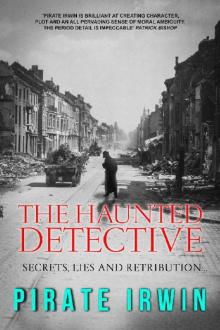- Home
- Pirate Irwin
The Compromised Detective
The Compromised Detective Read online
The Compromised Detective
Pirate Irwin
© Pirate Irwin 2017
Pirate Irwin has asserted his rights under the Copyright, Design and Patents Act, 1988, to be identified as the author of this work.
First published by Endeavour Press Ltd in 2017.
This edition published by Sharpe Books in 2018.
To my parents Jonathan and Mikaela
whose love of a good story inspired me to write
“France may still need one day an image that is pure. She must be left this image.”
– General Charles de Gaulle 1944
Table of Contents
CHAPTER ONE
CHAPTER TWO
CHAPTER THREE
CHAPTER FOUR
CHAPTER FIVE
CHAPTER SIX
CHAPTER SEVEN
CHAPTER EIGHT
CHAPTER NINE
CHAPTER TEN
CHAPTER ELEVEN
CHAPTER TWELVE
CHAPTER THIRTEEN
CHAPTER FOURTEEN
CHAPTER FIFTEEN
CHAPTER SIXTEEN
CHAPTER SEVENTEEN
CHAPTER EIGHTEEN
CHAPTER NINETEEN
CHAPTER TWENTY
EPILOGUE
CHAPTER ONE
They came for him early in the morning. Gaston Lafarge had been expecting them ever since the former Chief Inspector had returned to ‘liberated’ Paris and to be honest he was relieved it had happened so quickly.
He had nothing to live for now. The vessel carrying him and his dreams of a new life in Argentina lay at the bottom of the Atlantic Ocean after being torpedoed. With it had gone his wife Isabella and his daughter Isadora while his son Pierre was posted as missing.
He had been one of the few fortunate passengers – he smiled sourly at that – to have been rescued by a French fishing boat, whose captain was suspiciously a long way from his usual territories, but Lafarge and the others were in no mood to ask him why.
The miserable little group, numbering maybe 30, was deposited in the port of Bayonne on the south west coast of France.
Despite the Allies having landed in Normandy in June the Nazis still controlled a huge swathe of France and Lafarge had been ordered by an officious and unsympathetic Gestapo officer to return to his home, his apartment near Père Lachaise cemetery in Paris.
It hadn’t been the easiest of trips, bombing raids constantly bringing the train to a halt, although the one benefit was that it was all but empty.
The conductor looked at him as if he was deluded to be travelling to a city which was more than likely to become the Stalingrad of the west given that Hitler was in all probability going to be as ungracious a loser as he had been uncommonly magnanimous to the French when he had been the victor.
The Paris he had returned to was vastly different to the one he had left hurriedly in 1943; having committed three murders he had good reason to quit while he was marginally ahead. The atmosphere was really tense.
The Germans – those that remained to control the city as the majority had been sent to Normandy to try and repel the Allied Forces – looked apprehensive and were increasingly trigger-happy although Lafarge corrected himself on the latter observation as the occupiers had never been too restrained in dispensing ‘their justice’.
It was rare to see a uniformed German on his own as one had before; now even the officers went round in groups as they prepared themselves for either an assault from outside Paris or even an uprising from within, and assassinations of lone Germans were becoming increasingly common.
The uprising when it did come passed Lafarge by, or at least he didn’t get involved. He could hear the crackle of gunfire and the explosions from his apartment, but he was just content to mope inside it and drink steadily throughout the day to try and dull his sense of loss.
It was thanks to his kindly concierge Madame Grondon, who had done him several enormous favours during the Occupation at great personal risk, that he learned the outcome had gone against the Germans and the feared destruction of the city of light had not taken place after all.
The sudden ringing of the bells from the churches round Paris confirmed her version. She had provided him with some food, as she said he couldn’t just rely on a liquid diet, and had then profited from the lifting of restrictions of movement to go and visit relatives in Orléans.
Lafarge had ventured out not long after; he needed tobacco and had wandered almost as if he was anaesthetised through crowds of celebrating Parisians as they forgot temporarily the shame, the fear and for some the disgrace of what they had colluded willingly in during four years of Occupation.
Lafarge was in no mood to forget what had taken place while he had been a member of the police force, and he knew that once the initial ecstasy had died down he and others would be brought to account for the crimes perpetrated during that time.
Not that he was guilty of aiding in the rounding up of the Jews, children included.
Far from it for he had actively intervened to punish one such officer, but regardless of that there would be repercussions for those who had worked for the late and unloved Vichy Government.
The members of that administration – including his father, as he had been Marshal Petain’s most trusted advisor – had been packed off unceremoniously to Germany by their German overlords.
Thus it was that Lafarge was not surprised to hear the knock on his door early that morning. The only surprise was they didn’t break it down, but then maybe the new order was going to do things by the book and show that even taking revenge can be done courteously and using legal means.
He had dressed in what was now his best suit – most of them had gone down with the ship – as he thought he might as well give a good first impression even if they believe you are a low-life collaborator.
He had also washed his still thick, blond curly hair, and had been pleasantly surprised that he fitted into his chalk pinstripe suit, for not having eaten much since the tragedy his flabby frame had become leaner, although looking in the mirror he looked far older than his 40 years.
He only hoped his blue eyes weren’t still flecked at the corners with red blood vessels and betrayed the fact he had been making up for his lack of eating by imbibing ferocious amounts of wine and alcohol. Even so he had not been able to do anything about his breath as he did not have any toothpaste, which was increasingly difficult to find.
That minor detail aside, it was a smart and clean former Chief Inspector who opened the door to his visitors.
There were two of them. Lafarge looked nervously over their shoulders to see if there were any others on the stairwell or either side of the door but saw no one else.
He breathed a sigh of relief for this meant that it was unlikely to be a summary execution. The two who had come for him were both young and male, dressed in suits adorned with FFI armbands to identify themselves as members of the internal resistance that had begun the battle for Paris.
Lafarge smiled thinly at them and gestured for them to come in. They both accepted the invitation and stood in the middle of his drawing room – a rather grand term Isabella had given his small living room – while he went through the formalities and showed them his ID papers, police card and handed them his service revolver.
Neither of them seemed to be in charge, though the sharper-looking one – an assumption Lafarge made because he was wearing metal round rimmed glasses which gave him an intellectual if rather severe look – was the one who leafed through his papers.
Not a word had passed between the three of them thus far, though the silence was not an uncomfortable one. More that there was not much to be said for there could be only one outcome and that was
for him to go with them.
Eventually Lafarge broke the silence and offered them a coffee as a reward for their behaving in such a restrained and polite manner with him. For he imagined that they would have preferred to act very differently with someone who not only had worked for the police but also had such an influential connection with the former regime. He wasn’t going to kid himself that they hadn’t been specially selected and briefed on who he was.
They both accepted the offer of the coffee – another gift from Madame Grondon – and then used the time up waiting for it to come to the boil to look round the rest of the apartment, that being two bedrooms and a bathroom. They flicked idly through some papers on Lafarge’s wobbly old oak desk, but they appeared to be pretty disinterested perhaps, he surmised, because waiting for him probably at his old headquarters of Quai des Orfèvres was a senior detective with a thick dossier on him.
He handed them their coffees and asked them their names as it dawned on him in his befuddled state he had shown them confirmation of his identity but they had not reciprocated.
“I’m Yohan Lejeune and this is Marius Ballack,” replied the one with the glasses.
“What do you do when there’s not a war going on?” asked Lafarge deciding to try and keep some form of discourse going.
Lejeune, a clean cut well-built fellow with close cropped blond hair, smiled.
“What you mean … when we are not out rounding up collaborators? Well I’m a law student and Marius is at medical school. Now, former Chief Inspector Lafarge, we should go,” said Lejeune, his tone clipped and authoritative despite his youth.
Lafarge nodded, a bit alarmed because judging by Lejeune’s reply, obviously they had him nailed down as a collaborator and it was going to take more than the offer of a coffee to prove otherwise.
CHAPTER TWO
The Quai des Orfèvres, the historic nerve centre of the French police which was adjoined to the Palais de Justice, he returned to was vastly different to the one he had left in a triumphant mood a few months before.
Quite aside from the bullet-marked buildings and burnt-out German military vehicles which became more commonplace as they neared the headquarters – his former colleagues had obviously put up quite a fight as the net closed on them, thought Lafarge – were the roadblocks now manned largely by civilians who bore similar armbands to Lejeune and Ballack.
Inside 36 Quai des Orfèvres too there were signs of a struggle plus mounds of paper strewn across the courtyard and tossed on the stairs as the guilty parties had been caught in the act of trying to erase their crimes by destroying the paperwork. As if that would suffice, thought Lafarge grimly; it will take a lot more than that and a physical cost too before any part of that bill will be paid.
The drive across the city had taken place with the minimum of chatter for which Lafarge was grateful as he had to prepare himself for what he anticipated would be a long and demanding interrogation. He reflected on how when he had left the building last December he had thought it would be the last occasion he would ever do so and had smiled at the fact not many triple murderers to his expert knowledge had left there a free man.
He had also left with a certain sense of accomplishment, having helped in ridding the police of their venal and nakedly ambitious head René Bousquet who, in the tradition of conceited men, had overstepped the mark and got involved in some ridiculous jewel burglary.
However, now all the events surrounding that and the murders would come into play again, because it would be open season on his time during the Occupation with the Police Judiciaire following his return from a prisoner of war camp.
He wondered whether there was anything new on that, though he doubted it. He had left no trace that he could remember which could lead back to him, and in any case he had survived a grilling from the German military intelligence Abwehr, as one of the victims had been one of their own, Colonel Karl von Dirlinger.
He just hoped he was strong enough to withstand a similarly probing set of questions from a group of detectives who would view him with distaste for having collaborated. His one hope, though he admitted it was a vain one, was that his former superior Georges-Victor Massu had been kept on. The loss of Isabella and his daughter, Isadora, and probably Pierre, his son, plus his own near escape from death left him pretty raw and relatively easy prey for his interrogators.
Lafarge climbed the stairs to the floor where Massu had had his office, and Lejeune and Ballack kept him company, the air of courtesy extending to them exchanging cigarettes while they waited outside the office for him to be called. He could hear a lot of noise emanating from another office down the corridor – raised voices and the occasional silence that followed what he took to be a slap.
Some things haven’t changed then, only the person performing the interrogation has, he thought darkly.
He wondered whether the most vicious and ardent of the heads of the Brigades Spéciales had managed to make good their escape, or whether they had been caught – and, he hoped, suffered – accordingly before being executed.
To his mind they did not deserve the treatment he was being given. It was they largely who were responsible for him being there for having aided and abetted the Nazis at first and then actively engaged in rounding up the Jews and also resistance cells.
His thoughts and reminiscences were brought to an abrupt halt as the door to the office numbered 315 that he had visited so often when he was a detective, swung open and there standing before him was not Massu but another of his former colleagues, Lucien Pinault.
The disappointment that it wasn’t Massu was countered by the fact Pinault was to Lafarge’s mind in the same mould. Namely he had integrity and was not renowned for incriminating people without first finding the evidence, something several others had conveniently forgotten and had certainly been encouraged to do so by the Nazis.
However, Pinault was also renowned for his attention to detail and for his determination to ensnare his prey once he believed the person was guilty. He had a swarthy complexion, wore iron-rimmed spectacles – not quite the gold a law student could afford, joked Lafarge to himself – and was, the former Chief Inspector remarked, dressed in the same type of pin stripe suit he was wearing.
Of course there the similarity ended, for one was still in the police while the other was about to battle not only to save his name but also perhaps his life.
Pinault smiled at Lafarge – well he hoped it was at him and not just at Lejeune and Ballack – and bid him to come into the office while telling the students to wait outside. Lafarge entered, observing that it looked tidy by comparison to the rest of the building, but still could do with a fresh coat of paint and the wooden desk needed a good going over with a bit of polish. He took the chair he was offered by Pinault, who sat himself down in the one behind the desk which Massu had for so long occupied, and awaited the interrogation.
Pinault didn’t seem to be in any hurry to do so; he grunted a bit as he sorted through some dossiers lying on the desk, and then almost as if he wanted to dispense with any sort of small talk he offered him a coffee. Lafarge knew that this at least would not have changed and be as disgusting as ever, but nevertheless he gratefully accepted.
“Now let’s get down to business,” said Pinault curtly and then Lafarge saw his mouth curl into one of disgust as he tasted the coffee.
Lafarge laughed, inducing Pinault also to do so before he resumed his opening remarks.
“For your information Commissaire Massu has been removed from his duties and is presently under investigation. There is no need for me to tell you what the enquiries pertain to as we both know what that is. All I will say is that it has left me with a whole host of extra work, not least the search for the abominable Doctor Petiot,” said Pinault with a deep sigh.
The mention of Petiot immediately focused Lafarge’s attention as it was to the serial killer – his crimes far outdid Lafarge’s miserly three murders although, as the former Chief Inspector conceded, it only took one
to get you guillotined – whom he had mistakenly entrusted the safe passage of the lawyer Pierre-Yves de Chastelain the year before.
This was, of course, not the sort of information he wished to impart to Pinault, least of all at the start of the interrogation. The longer it took for the ‘good doctor’ to be found the better it would be for him as he couldn’t count on Petiot not bringing him into it if it could save his neck, even if in this instance he had acted innocently.
“So, Lafarge, basically what I am saying is that I prefer to deal with this more unwholesome side of my work quickly. Before you raise the question of why I am dealing with you and not someone who was untainted by the previous regime, it is because I have already passed my examination over my behaviour during that painful and regrettable period.
“I was reluctant to take on this body of work, but having thought about it I believe that it is better for someone who was a detective at that time to conduct these interrogations. I hope you find that some consolation.
“Now before I proceed I would like to convey to you my condolences for what happened to you and your family. I cannot even imagine what it must have been like and the grief you are now experiencing.”
Lafarge nodded his appreciation of Pinault’s remarks but remained silent. Pinault waited a few seconds before opening the file in front of him and glanced quickly down the first page before looking up and staring at his former colleague in the eye.
“I want to know if the reasons for you taking passage on that ship were because you wanted to avoid the consequences of actions taken while you worked as a policeman under Vichy,” said Pinault, his voice turning suddenly from sympathetic to glacial.
Lafarge tensed, surprised at the question, and wondered whether this was leading on to some information Pinault had on the murders.
“No. It was to give my wife and the children a new start back in her home country, something I had promised her once I finished the Suchet case. I would like to add that I do not reproach myself for my behaviour during my time as a detective, whether before the war or during the Occupation.

 The Compromised Detective
The Compromised Detective The Twisted Patriot
The Twisted Patriot The Tortured Detective
The Tortured Detective The Haunted Detective
The Haunted Detective